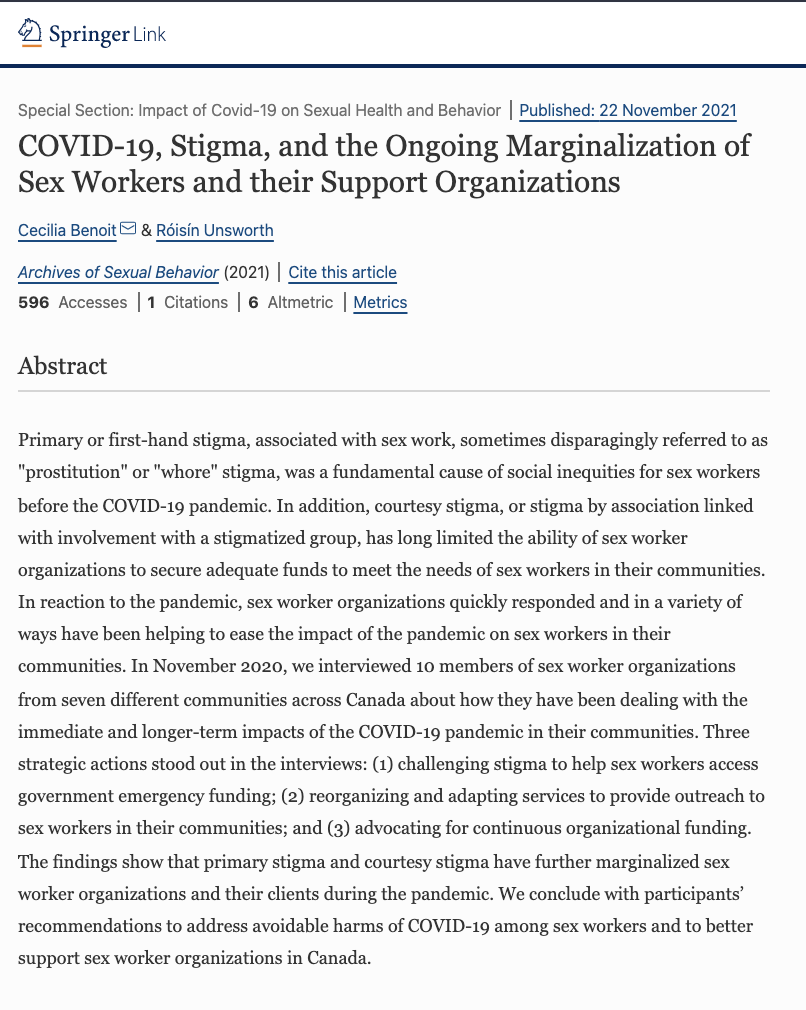Abstract
Primary or first-hand stigma, associated with sex work, sometimes disparagingly referred to as “prostitution” or “whore” stigma, was a fundamental cause of social inequities for sex workers before the COVID-19 pandemic. In addition, courtesy stigma, or stigma by association linked with involvement with a stigmatized group, has long limited the ability of sex worker organizations to secure adequate funds to meet the needs of sex workers in their communities. In reaction to the pandemic, sex worker organizations quickly responded and in a variety of ways have been helping to ease the impact of the pandemic on sex workers in their communities. In November 2020, we interviewed 10 members of sex worker organizations from seven different communities across Canada about how they have been dealing with the immediate and longer-term impacts of the COVID-19 pandemic in their communities. Three strategic actions stood out in the interviews: (1) challenging stigma to help sex workers access government emergency funding; (2) reorganizing and adapting services to provide outreach to sex workers in their communities; and (3) advocating for continuous organizational funding. The findings show that primary stigma and courtesy stigma have further marginalized sex worker organizations and their clients during the pandemic. We conclude with participants’ recommendations to address avoidable harms of COVID-19 among sex workers and to better support sex worker organizations in Canada.
Introduction
The 2020–2021 COVID-19 global pandemic has caused widespread negative economic, social, and health harms. For people who sell sexual services, the impacts have been severe—worsening their already precarious working conditions and access to health and social services (Benoit, 2020).
Commercial sex work involves several hierarchies of exclusion, the most prominent of which are: childhood and adult economic vulnerability, gender, race, sexuality, and legal contexts (Benoit et al., 2020b; Hardy & Saunders, 2015; Platt et al., 2020; Rosen & Venkatesh, 2008). Compared to other Canadian workers, sex workers are younger, more likely to identify as women, Indigenous, and non-heterosexual, while also being less likely to have finished high school, own their own home, or to be currently married or living with common-law partners (Benoit et al., 2017). Sex workers report poorer physical and mental health, higher unmet health needs, and are more likely to have a long-term disability (Benoit et al., 2016a; Shannon et al., 2009). They also report a high degree of food insecurity and other forms of material hardship (Rosen & Venkatesh, 2008). In a recent study, two-thirds said in the last 12 months, they received free food or meals, half of the respondents disclosed that they borrowed money from friends or family to help meet bill payments and one-third said they had not paid the full amount of their rent or mortgage, or the full amount for utilities (Benoit et al., 2020b). Finally, marginalization of sex workers as a group is evident by their high rates of assault and victimization compared to the general population (Bungay & Guta, 2018; Comack & Seshia, 2010; Deering et al., 2014; O’Doherty & Waters, 2019).
Benoit, C., Unsworth, R. COVID-19, Stigma, and the Ongoing Marginalization of Sex Workers and their Support Organizations. Arch Sex Behav (2021).






